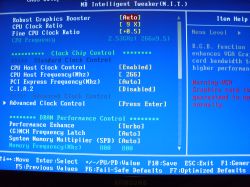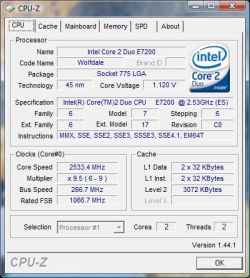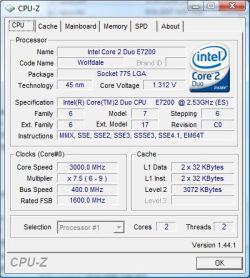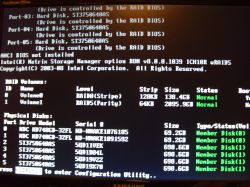|
Gigabyte GA-EP45-DS3R
BIOS:
A lot of people have reported having problems with the early revisions of this motherboard's BIOS. As a rule of thumb, I usually upgrade a motherboard's BIOS first thing when I get it to make sure there won't be any compatibility issues. Another feature of this board is that it has dual BIOS. This helps prevent a user from accidentally "bricking" the board from a failed BIOS update.
The GA-EP45-DS3R features an Award BIOS. This makes it look very generic, so instead of boring you with the same thing you've seen, I will show you the overclocking menu where the magic happens.
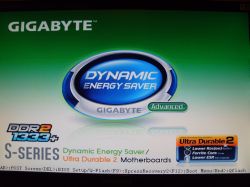 |
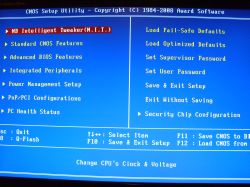 |
GA-P45-DS3R splash screen |
BIOS main page |
Overclocking:
For a midrange motherboard, this thing packs more overclocking options than most people will ever need to use. It has settings for adjusting almost every aspect of the motherboard and also allows for a rather hefty overvoltage on most parts. Think long and hard about cranking up the voltage too high unless you want the magical smoke to come out of your nice new processor or other component.
Overclocking menu |
For testing purposes I tried overclocking an Intel E7200. I was able to easily overclock it to 3.2GHz on stock voltage. I brought it back down to 3.0GHz due to thermal concerns regarding the stock heat sink that was attached. Once I set it up with liquid cooling, I fully expect to be able to hit the 4GHz barrier. Stay tuned for that article coming soon.
E7200 at stock settings |
E7200 overclocked to 3.0GHz |
Raid:
One of the key features of the ICH10R chipset is its raid abilities. Being the eccentric person I am, I of course had to fill up all of the SATA ports with hard drives and set up two nice raid arrays.
The raid screen with one raid 0 array and one raid 5 array |
Yes, that is a 2TB raid 5 array. I am a firm believer of keeping my data safe from hard drive failure, and raid 5 is a great way to do that. I remember when 300GB was considered a ridiculous amount of storage, but I digress. Setting up the raid arrays was actually much easier than my experience with other raid BIOS. I even had the unfortunate pleasure of testing the rebuilding of the raid array after I had copied all of my data over. I accidentally knocked loose one of the power cables going to one of the hard drives. The installed raid software alerted me to a drive failure and I proceeded to re-plug in the drive and it rebuilt the raid array without a hitch.
REALTIME PRICING





